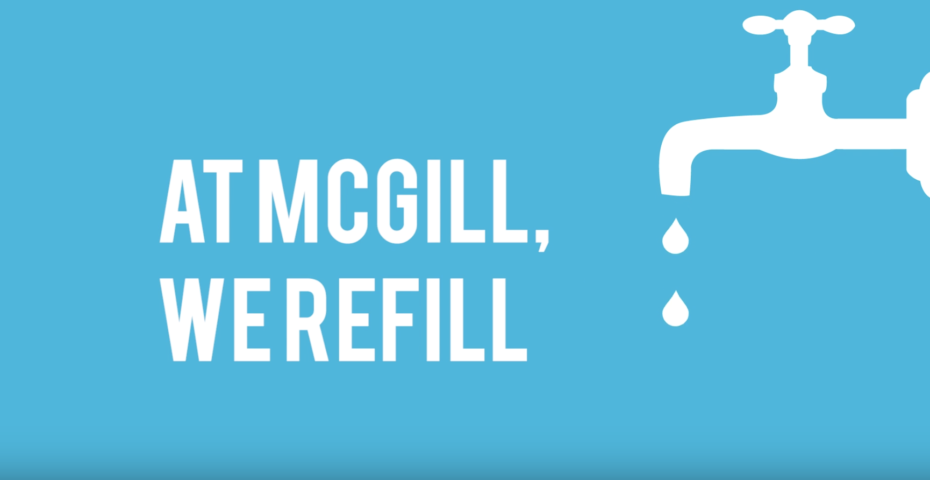
On March 22, 2018 – World Water Day – McGill announced that it planned to eliminate the sale of single-use plastic water bottles on campus by the end of May 2019. This represents 85,000 bottles per year.
“We’re concentrating on bottled water for a few reasons. For one, we are incredibly fortunate here in Montreal to have safe, potable water provided by the municipality, which makes relying on single-use bottled water largely unnecessary,” said François Miller, Director of the McGill Office of Sustainability at the time of last year’s announcement. “Second, when you think about the amount of fossil fuels required to both produce and transport the bottles, drinking tap water is also a way to reduce greenhouse gas emissions.”
Thus was born the Refill McGill campaign. For the past year, the initiative has worked toward reducing the number of plastic bottles sold, increasing access to municipal drinking water and raising public awareness as to the benefits of eliminating single-use plastic water bottles on campus.
These efforts have not gone unnoticed. On March 22, the Quebec-based Eau Secours advocacy organization will confer upon McGill a Communauté bleue designation for the University’s commitment to responsible water management.
With the May deadline fast approaching, the Reporter caught up with Miller for an update on this initiative and to find out what the University is doing to help people transition to life without single-use water bottles.
Why is McGill only phasing out the sale of bottled water?
The University chose to focus on bottled water as opposed to other bottled beverages, as water is already available for free from our taps and fountains across campus.
Why is bottled water still being sold on campus at present?
The sale of bottled water won’t be fully phased out until the end of May 2019. Until then, some locations will still be selling bottled water.
How is the ban on bottled water being enforced?
The University has been working with individual vendors to ensure that they will not be selling single-use plastic water bottles after May 2019 by including it in their contracts and policies.
Of course, this doesn’t stop anyone from bringing bottled water onto campus. However, it does mean that the University will not be selling single-use plastic water bottles after this date.
Given the quantity of heritage buildings at McGill, how confident are you that your tap water is safe to drink?
I drink it every day myself – so I’m completely confident.
All our buildings are connected to the municipal aqueduct network, just like every household in Montreal. Our relatively high volume of water consumption (we are 46,000 people working and studying at McGill) also means that water never stagnates for a long period in the pipes, which further reduces the likelihood of water quality issues.
In addition, our Environment Health and Safety (EHS) department runs water quality tests on a random basis and on demand. EHS also receives updates from the city on the quality of the source water we are receiving. For years, the water quality has respected all criteria for human consumption.
Are you concerned that the absence of a healthy beverage option might make people choose less healthy options like sodas and flavoured waters?
This is a very valid concern. But we will address this issue by encouraging people to use water fountains in various ways, such as:
- Installing or upgrading 30 water fountains across our campuses (Downtown, MacDonald and Gault)
- Selling a $5 reusable bottle in the cafeterias and bookstores
- Placing wayfinding footsteps leading to water fountains
- Promoting the campaign through posters, educational videos and events
Are you concerned about students getting dehydrated at large, outdoor events on hot days (such as orientation in the fall)?
The University has obtained three outdoor water carts that can be hooked up to a standard hose connection and fill multiple bottles at the same time. Many event organizers have used these already (including Frosh and Orientation), and have found them to be a viable way to keep people hydrated. Large events will also have some single-use plastic water bottles on-site to distribute in the case of an emergency. Finally, we invite all staff and students who attend events at McGill to bring their own bottle that they can refill.
The single-use water bottle has become a ubiquitous accessory for so many people. Do you think we are ready for this transition?
We know that single-use water bottles pose a significant threat to the environment. But we also know that environmental issues are top of mind for many people – especially young people who will soon be stewards of the planet. This past Friday, tens of thousands of students marched through the streets of Montreal as part of climate change demonstrations taking place around the world. The time for change is now and I expect people to be very supportive of this important initiative.
Where can members of the McGill community find more information on the Refill McGill campaign?
Most of the campaign information is available on the Sustainability website. For all other questions, send us an email.
Check out Refill McGill’s Bottled Water vs Tap Water taste test below
